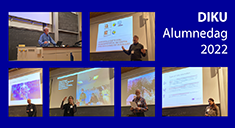DIKU Alumni Day 2022
The DIKU Alumni Association together with DIKU Business Club invites you to the annual Alumni Day.
We are happy to present an exciting lineup of speakers for the talks programme:
You can meet and listen to our Head of Dept. Professor Jakob Grue Simonsen, Professor and head of the Pioneer Centre for AI Serge Belongie, associate Professor Boris Düdder, assistant Professor Valkyrie Savage, and professor Barry Brown. We have also invited Carsten Lassen, director of 'Specialisterne Denmark', to talk about their special mission.
Registration has closed. You can attend the talk program online through a webcast that starts at 5.15 pm. Find the link in the upper right corner. If you have a sincere wish of attending physically, email alumni@di.ku.dk and ask for remaining seats.
Program
| 17.00 - 17.15 |
Registration and mingling |
| 17.15 - 17.30 |
Welcome - and the State of Affairs at DIKU by Jakob Grue Simonsen, Head of Department, DIKU |
| 17.30 - 17.45 |
Serge Belongie, Director, Pioneer Centre for Artificial Intelligence, Professor, Department of Computer Science (DIKU) Scientific talk: Searching for Structure in Unfalsifiable ClaimsWhile advances in automated fact-checking are critical in the fight against the spread of misinformation in social media, we argue that more attention is needed in the domain of unfalsifiable claims. In this talk, we outline some promising directions for identifying the prevailing narratives in shared content (image & text) and explore how the associated learned representations can be used to identify misinformation campaigns and sources of polarization. |
| 17.45 - 18.00 |
Boris Düdder Associate Professor, Section for Software, Data, People & Society Security talk: Trustworthiness vs. Security and EfficiencyWhen aiming at achieving optimal security, optimal efficiency and also meeting climate targets in a system - how do you handle the trade-off between these goals? |
| 18.00 - 18.20 |
Carsten Lassen, CEO of Specialisterne Danmark Specialisterne – Employ Different ThinkingThe business community is gradually understanding that their employees constitute a neurodiverse group. All brains think differently, have to be stimulated differently, are given different motivations – and are managed differently. So far, all management tools have focused on the 70-80 per cent that we define as neurotypical. But the fact is that up to 20% of a given workforce is what we call neuro-diverts. They may have traits that point towards autistic behaviour, such as ADHD, dyslexia, OCD, etc. What they have in common is often strong academic competences, which are far too often not exploited optimally – and everybody loses to this effect. Specialisterne have made it their mission to educate the labour market to create the best possible framework for all employees. They run a special academy – the Specialists Academy – for IT-savvy graduates who need a little extra coaching to land in the right job, and they run management training programmes aimed at companies that have realised the importance of increasing their attractiveness towards new talent by becoming more resilient. |
| 18.20 - 18.30 |
Short break |
| 18.30 - 18.45 |
Barry Alan Brown, professor, Section for Human-Centred-Computing The halting problem: When self-driving cars stop in trafficDespite early successes, building self-driving vehicles is clearly a massive long-term challenge. In this talk I will describe our work studying the testing of self driving cars on public roads, in particular, the Tesla ‘FSD beta’, and the Waymo driverless taxi service. While the cars featured in these videos can (mostly) navigate the physical environment of the road, it is clear that they still face multiple challenges in communicating with other drivers. The road is a surprisingly social space, and this creates major challenges for self-driving cars to both communicate their actions to others, but also to see how others communicate to them. In particular, self-driving cars often halt suddenly on the road. While these behaviours do not break any traffic rules (and in many cases is the safe thing to do) they break the sequential and temporal expectations of road interaction. I conclude by discussing what implications this might have for the prospect of safe self-driving cars being available soon. |
| 18.45 - 19.00 |
Valkyrie Savage, Assistant professor, Section for Human-Centred Computing Scientific Talk: AirLogic : 3D Printing Ideas from the 1960s to Create Electronics-free Interactive Objects with Input, Output, and Computation
One popular topic in Human-Computer Interaction (HCI) research is how to help people create new interactive devices, like video game controllers or toys. After important patents expired in 2011, 3D printers have become a popular tool for this. However, 3D printers are generally used to create only the shell of an object; the shell is then filled with wires and electronics in order to make the object functional. We explored using a practically-abandoned research area from the 1960s called fluerics, which leveraged streams of fluid as a computational medium in lieu of electronics. The structures needed for fluerics are compatible modern 3D printers, and we demonstrate integrating them with various pneumatic inputs and outputs in a system we call AirLogic. AirLogic devices can perform basic computation on user inputs and create visible, audible, or haptic feedback; yet they do not require electronic circuits, physical assembly, or resetting between uses. |
| 19.00 - |
Thank you and short trailer for the Christmas event 24 November 2022 by Head of the DIKU Alumni Board, Ioana Mogensen. ....and then we proceed to the Reception buffet with tapas, beer, wine, and soft drinks in the Canteen Area at HCØ. |

